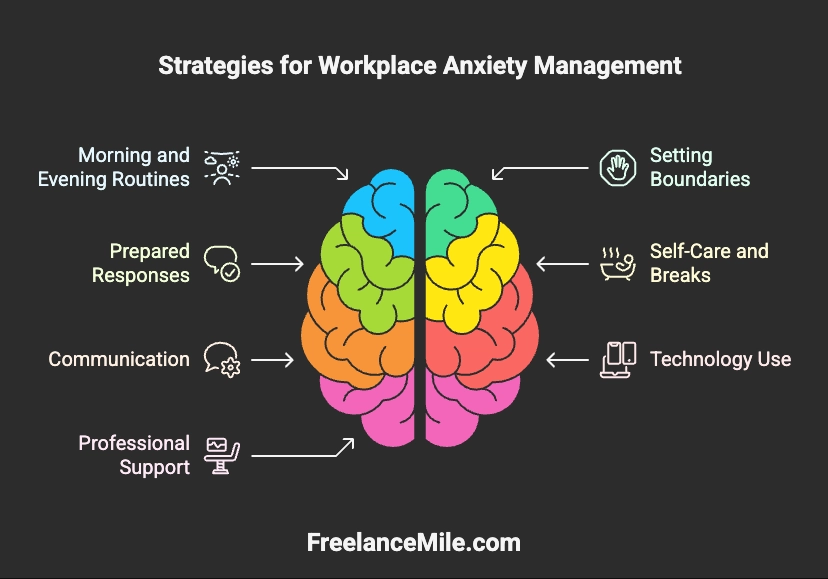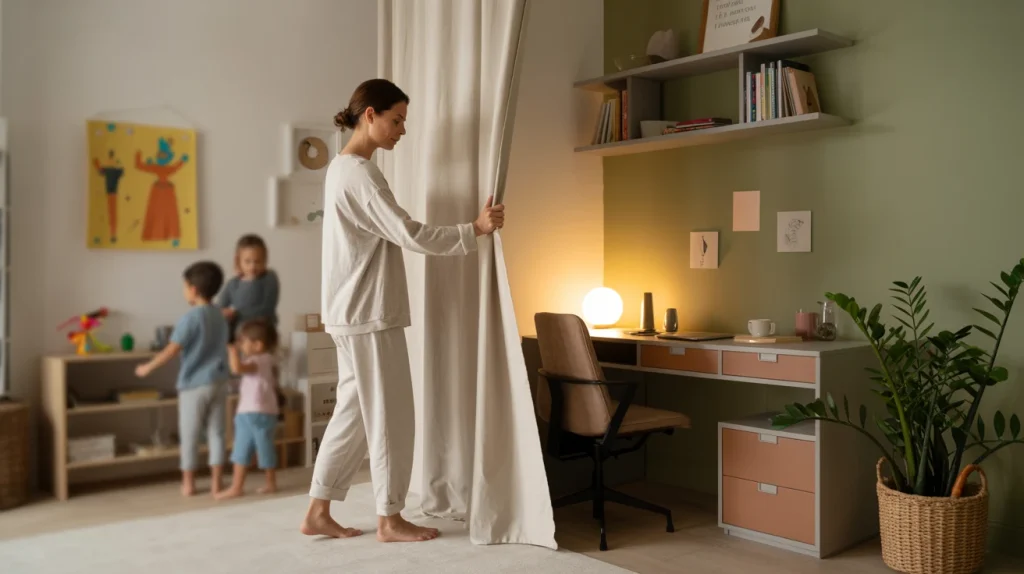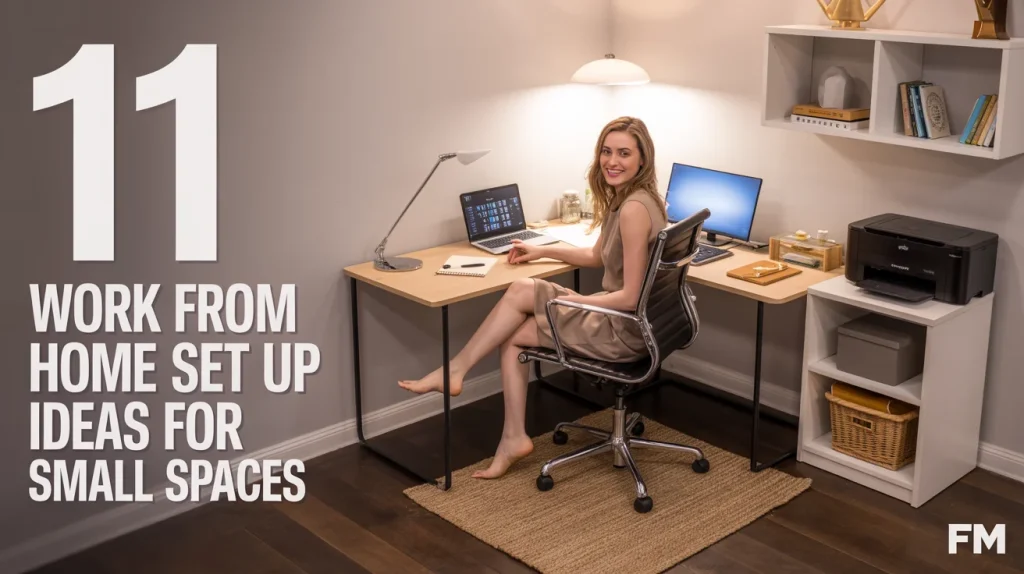Have you ever felt your heart racing before a big meeting or found yourself overthinking every workplace interaction? I’ve been there.
As someone who’s navigated the professional world while managing anxiety, I know firsthand how challenging it can be to find a career that doesn’t trigger constant worry.
For years, I watched talented friends and colleagues struggle to find their place in high-pressure work environments that simply weren’t compatible with their anxiety.
The truth is, having anxiety doesn’t mean you can’t have a fulfilling career—it just means you might need to be more strategic about the type of work you choose.
Finding the best jobs for people with anxiety isn’t about limiting your potential; it’s about setting yourself up for success in an environment where you can truly thrive.
After helping countless professionals transition to more anxiety-friendly careers, I’ve compiled this list of positions that offer stability, autonomy, and lower stress levels. Let’s check them out!
15 Best Jobs for People with Anxiety

Here are 15 of the best jobs for people with anxiety, including key details about each role and how to get started.
1. Content Writer/Copywriter
Content writing has been a lifesaver for many of my clients with anxiety.
This role allows you to work behind the scenes, crafting messages without the pressure of face-to-face interactions.
As a content writer, you’ll typically work on your own schedule, especially if you’re freelancing.
This flexibility means you can take breaks when anxiety flares up or work during the hours when you feel most focused and calm.
The creative aspect of writing can also be therapeutic. Many writers report entering a “flow state” where worries temporarily fade away as they focus on crafting the perfect sentence or story.
With the advancement of remote work, content writing positions are more accessible than ever. Many companies now hire full-time remote writers, or you can build a freelance business through platforms like Upwork or Contently.
Average salary range: $45,000-$70,000 annually, with freelancers often earning $50-100+ per hour depending on specialization and experience.
2. Librarian
Libraries provide calm, structured environments that many anxiety-sufferers find comforting.
As a librarian, you’ll work in a quiet setting with predictable tasks and limited high-pressure situations.
Modern librarians do much more than shelve books—they research, catalog information, help patrons find resources, and often work with database systems.
These varied but methodical tasks can be engaging without being overwhelming.
While you will interact with library patrons, these interactions are typically brief and focused on specific informational needs, making them more manageable than extended customer service roles.
To become a librarian, you’ll typically need a Master’s degree in Library Science (MLS), though some assistant positions require only a bachelor’s degree. Learn more about librarian qualifications at the American Library Association.
Average salary: $60,000-$75,000 annually, with benefits like healthcare and retirement plans.
3. Graphic Designer
Graphic design offers a ideal blend of creativity & technical skill, allowing you to express yourself while following clear guidelines.
I’ve seen several anxious professionals thrive after transitioning to design careers.
Many graphic designers work remotely or as freelancers, giving you control over your work environment and schedule.
You can set up your workspace to be a comforting, anxiety-reducing haven.
While client meetings are sometimes necessary, much of your communication can happen via email or project management tools, reducing social pressure.
To get started, you’ll need proficiency in design software like Adobe Creative Suite. Many designers are self-taught, though formal education can help. Check out Behance for inspiration and to create your portfolio.

Average salary: $50,000-$85,000 annually, with freelancers often charging $25-150 per hour depending on specialization.
4. Accountant/Bookkeeper
Numbers don’t judge, which is why accounting and bookkeeping can be excellent options for people with anxiety.
These roles offer structure, clear objectives, and minimal unexpected surprises.
The methodical nature of accounting work can be soothing for anxious minds. There’s comfort in knowing that columns should balance and that there’s a right answer to be found.
While you may need to interact with clients occasionally, most of your time will be spent working independently with financial data and software.
Entry-level bookkeeping positions often require only a certificate or associate’s degree, while full accountants typically need a bachelor’s degree. The American Institute of CPAs provides resources for those interested in this career path.
Average salary: $50,000-$90,000 annually, with opportunities for advancement.
5. Software Developer
Coding can be a meditative experience for many people with anxiety.
The focus required to solve complex problems often pushes anxious thoughts to the background, creating a respite from worry.
While software development teams do collaborate, much of the actual coding work is done independently.
Many development teams now work remotely, further reducing social pressure.
The tech industry increasingly values results over face time, meaning you can often set your own hours as long as you meet deadlines and attend necessary meetings.
Learning to code has never been more accessible, with platforms like Codecademy and freeCodeCamp offering free or affordable training.
Average salary: $70,000-$120,000+ annually, with remote options abundant.
6. Gardener/Landscaper
Working with plants has proven therapeutic benefits for anxiety sufferers.
Outdoor work connects you with nature and provides physical activity, both natural anxiety reducers.
As a gardener or landscaper, you’ll have tangible results to show for your efforts, which can be deeply satisfying and confidence-building.
While you may work on a team, many gardening tasks are performed independently, giving you space to work at your own pace without constant social pressure.
Entry requirements are low—while degrees in horticulture or landscape design can help, many start with basic knowledge and on-the-job training. The National Association of Landscape Professionals offers certification programs.
Average salary: $30,000-$50,000 annually, with higher earnings possible for specialized landscape designers.
7. Data Analyst
Data analysis offers the perfect combination of problem-solving and independent work that many anxiety sufferers appreciate.
The methodical nature of analyzing data sets provides structure and clear objectives.
Most data analysts spend the majority of their time working independently with data tools and software, with limited need for high-pressure presentations or constant meetings.
The growing field of data science means these roles are available in virtually every industry, allowing you to apply your skills in an area that interests you.
Entry-level positions typically require a bachelor’s degree in a relevant field, though certifications from platforms like DataCamp or Coursera can also help you break in.

Average salary: $60,000-$100,000+ annually, depending on specialization and experience.
8. Virtual Assistant
The virtual assistant role has exploded in popularity with the rise of remote work, offering flexible hours and the ability to work from the comfort of your own home.
While you will be supporting others, most communication happens via email, messaging apps, or scheduled video calls—no surprise face-to-face interactions that can trigger anxiety.
You can often choose clients and projects that align with your strengths and comfort level, gradually expanding your services as your confidence grows.
Getting started requires minimal investment—basic administrative skills, a reliable internet connection, and organization tools. Platforms like Upwork and Fiverr can help you find your first clients.
Average earnings: $15-40 per hour, with experienced VAs often charging $50+ per hour for specialized services.
9. Pet Care Specialist
For animal lovers with anxiety, working with pets can be both calming and fulfilling.
Animals don’t judge or create complex social dynamics, making interactions straightforward and genuine.
Roles range from dog walker to pet sitter to veterinary assistant, with varying levels of human interaction required.
Pet sitting and dog walking can be particularly low-pressure options.
Studies show that interacting with animals naturally lowers stress hormones like cortisol while increasing feel good chemicals like oxytocin—a natural anxiety treatment built into your workday!
To get started, consider certification through the National Association of Professional Pet Sitters or simply begin building a local client base through word of mouth and apps like Rover.
Average earnings: $25,000-$35,000 annually for full-time work, with pet sitters earning $20-50 per visit.
10. Medical Transcriptionist
Medical transcription offers the security of healthcare industry work without the high-pressure, fast-paced environment of direct patient care.
This role involves listening to recorded medical dictations and typing them into official medical reports—focused work that many people with anxiety find manageable and engaging.
Most medical transcriptionists work remotely, allowing you to create a workspace that supports your mental health needs.
While certification isn’t always required, completing a medical transcription program will improve your job prospects. The Association for Healthcare Documentation Integrity offers recognized certifications.
Average salary: $30,000-$50,000 annually, typically with hourly or production-based pay.
11. Web Designer
Web design combines creative and technical skills in a role that often allows for independent work and flexible scheduling.
Unlike some design fields that require constant client presentations, web designers can often communicate through email, project management tools, and occasional scheduled calls.
The satisfaction of seeing your designs come to life online provides tangible results that can boost confidence and reduce anxiety about your professional value.
Learning web design has never been more accessible, with platforms like Treehouse and Udemy offering comprehensive courses.

Average salary: $50,000-$90,000 annually, with freelancers often earning $40-150 per hour depending on specialization.
12. Archivist
Working with historical documents and artifacts in quiet, controlled environments makes archiving an excellent option for history buffs with anxiety.
Archivists spend most of their time cataloging, preserving, and organizing materials—methodical work that provides structure and clear objectives.
While you may occasionally give presentations or work with researchers, much of your time will be spent in peaceful, independent work.
Most archivist positions require a master’s degree in library science, history, or a related field. The Society of American Archivists offers resources for those interested in this career path.
Average salary: $50,000-$75,000 annually, typically with good benefits in institutional settings.
13. House Cleaner/Organizer
Cleaning and organizing can be meditative activities that provide immediate visual results, which many anxiety sufferers find satisfying and grounding.
As a house cleaner or professional organizer, you’ll typically work in empty homes or with minimal client interaction, reducing social pressure.
Physical activity naturally reduces anxiety, making this a role where the work itself can help manage your symptoms.
Starting your own cleaning or organizing business requires minimal investment—basic supplies and reliable transportation are the main requirements. For professional organizing, the National Association of Productivity & Organizing Professionals offers training and certification.
Average earnings: $20-40 per hour, with higher rates possible for specialized organizing services.
14. Technical Writer
Technical writing combines clear communication skills with detailed research—perfect for those who enjoy writing but prefer factual content over creative work.
These roles typically involve creating documentation, user manuals, and how-to guides, with clearly defined objectives and standards.
Most technical writers work independently for the majority of their day, with limited meetings and presentations required.
While some positions require specialized knowledge in fields like software or medicine, many technical writers learn on the job. The Society for Technical Communication offers resources and certification programs.
Average salary: $60,000-$90,000 annually, with remote options increasingly available.
15. Online Teacher/Tutor
Teaching online allows you to communicate your knowledge without the overwhelm of a traditional classroom environment.
You can structure sessions according to your comfort level, with one-on-one tutoring offering the most control over your teaching environment.
The scheduling flexibility of online teaching means you can work when you’re feeling your best and take breaks when needed.
Platforms like VIPKid, Outschool, and Wyzant connect teachers with students, making it easy to get started without building your own client base from scratch.
Average earnings: $15-50 per hour, depending on subject specialization and platform.
Why Certain Jobs Work Better for People with Anxiety
It’s important to understand what makes a job “anxiety-friendly.”
From my experience, I’ve identified several key factors that can make a huge difference.
First, predictable environments with clear expectations help minimize the uncertainty that often triggers anxiety.
When you know exactly what’s expected of you each day, there’s less room for the “what-ifs” that can spiral into anxiety.
Second, jobs with limited social pressure can be ideal. While some people with anxiety thrive in social settings, many find constant interaction draining or stressful.
Positions that allow you to work independently or with a small, familiar team often provide the right balance.
Third, roles that offer flexibility and control over your schedule can be game-changers.
The ability to take breaks when needed or work during your most productive hours can significantly reduce stress levels.
Finally, jobs that align with your natural strengths and interests will feel less like work and more like purpose.
When you’re engaged in tasks that you genuinely enjoy and excel at, anxiety often takes a backseat.
Tips for Managing Anxiety in Any Workplace

While choosing an anxiety-friendly career is important, developing strategies to manage anxiety is equally valuable.
Here are some approaches that have helped my clients thrive:
Create morning and evening routines that prepare you mentally for work and help you decompress afterward. Even five minutes of meditation or journaling can make a difference.
Set boundaries around availability. Just because you can be contacted 24/7 doesn’t mean you should be. Turn off notifications during personal time.
Practice prepared responses for situations that trigger anxiety. Anticipating common workplace scenarios—like meeting new people or handling unexpected tasks—and having a few go-to responses or coping strategies can help you feel more in control.
Prioritize self-care and regular breaks. Schedule short, frequent breaks to stretch, breathe, or step outside. Even a brief walk or a couple of deep breaths can reset your mind and lower stress.
Communicate your needs. If you’re comfortable, let your manager or trusted colleagues know about your anxiety. Setting expectations and asking for accommodations—like quiet workspaces or flexible deadlines—can make a big difference.
Use technology to your advantage. Leverage tools such as noise-canceling headphones, task management apps, or mindfulness apps to create a more supportive work environment.
Seek professional support when needed. Don’t hesitate to approach a therapist or counselor for guidance and coping strategies tailored to your situation. Numerous workplaces also offer Employee Assistance Programs (EAPs) with mental health resources.
Conclusion
Finding the best jobs for people with anxiety isn’t about limiting your career options—it’s about empowering yourself to thrive in environments that support your mental well-being.
Whether you’re drawn to creative roles like writing and design, structured paths like accounting and data analysis, or calming careers involving animals or nature, there are multiple opportunities to build a fulfilling professional life on your own terms.
The key is to understand your triggers, honor your strengths, & select a path that aligns with your unique needs. Pairing the right job with practical anxiety-management strategies can transform your work experience from stressful to satisfying.
Remember, anxiety doesn’t define your potential—it’s simply one factor to consider as you craft a career filled with purpose, peace, and personal growth.
No matter where you are in your journey, know that you’re not alone. With the right support and a thoughtful approach, you can find a job that not only accommodates your anxiety but also allows you to flourish.
The perfect fit is out there—sometimes, it just takes a little courage and creativity to find it.






